 Petzlover
Petzlover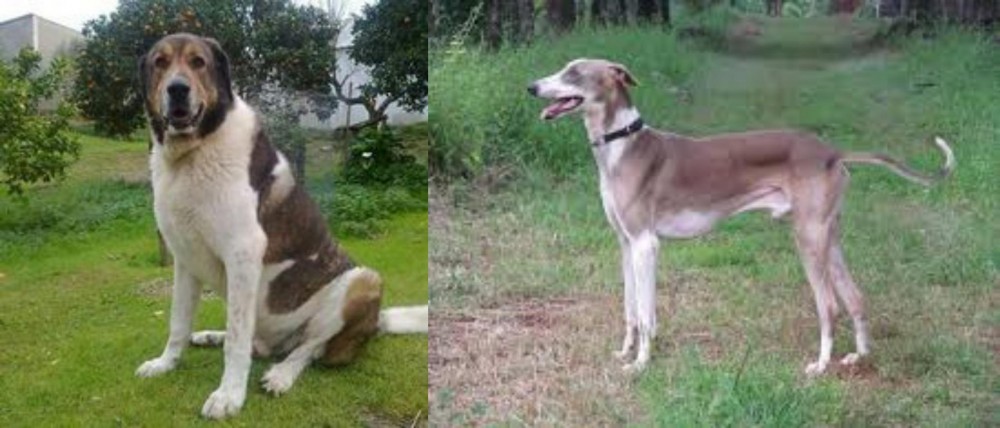 Cao de Gado Transmontano is originated from Portugal but Mudhol Hound is originated from India. Cao de Gado Transmontano may grow 11 cm / 5 inches higher than Mudhol Hound. Cao de Gado Transmontano may weigh 38 kg / 84 pounds more than Mudhol Hound. Both Cao de Gado Transmontano and Mudhol Hound has almost same life span. Both Cao de Gado Transmontano and Mudhol Hound has almost same litter size. Cao de Gado Transmontano requires Low Maintenance. But Mudhol Hound requires Moderate Maintenance
Cao de Gado Transmontano is originated from Portugal but Mudhol Hound is originated from India. Cao de Gado Transmontano may grow 11 cm / 5 inches higher than Mudhol Hound. Cao de Gado Transmontano may weigh 38 kg / 84 pounds more than Mudhol Hound. Both Cao de Gado Transmontano and Mudhol Hound has almost same life span. Both Cao de Gado Transmontano and Mudhol Hound has almost same litter size. Cao de Gado Transmontano requires Low Maintenance. But Mudhol Hound requires Moderate Maintenance
 The Cão de Gado Transmontano which is also known as the Transmontano Mastiff or Transmontano Cattle Dog is a large dog – in fact a giant dog breed. This is a rare molosser working dog, hailing from the region of Tras-os-Montes e Alto Douro Province in Portugal.
The Cão de Gado Transmontano which is also known as the Transmontano Mastiff or Transmontano Cattle Dog is a large dog – in fact a giant dog breed. This is a rare molosser working dog, hailing from the region of Tras-os-Montes e Alto Douro Province in Portugal.
The large dog has always been used to herd livestock and to also ward off wolves. It is believed that the dog’s roots come from the Tibetan Mastiff as well as a Portuguese cattle dog known as the Rafeiro do Alentejo. The dog also shares some similarities with the short-haired Estrela Mountain Dog.
In 1995 the breed was still exclusive to Portugal, but now the breed has been imported to Oregon, USA to be part of an experiment to document bigger breeds and their role in protecting livestock from wolves. They were re-introduced to north-east Oregon from 2008.
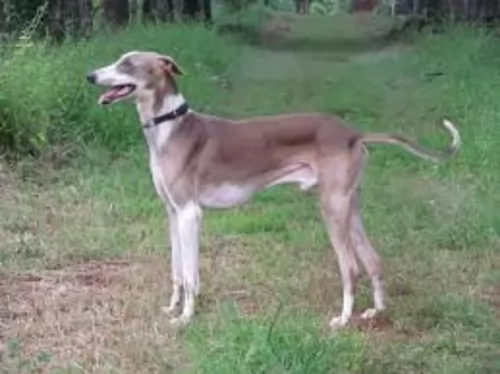 This seems to be the breed of many names. The Mudhol Hound comes from India and has been called the Caravan Hound, the Pashmi, the Karvanit, the Karwaani and the Pisuri Hound. Like so many other Indian breeds, the Mudhol Hound bears a strong look of the Greyhound. He is a sight hound and as such is lean and fast. He is ancient, healthy and loves his people.
This seems to be the breed of many names. The Mudhol Hound comes from India and has been called the Caravan Hound, the Pashmi, the Karvanit, the Karwaani and the Pisuri Hound. Like so many other Indian breeds, the Mudhol Hound bears a strong look of the Greyhound. He is a sight hound and as such is lean and fast. He is ancient, healthy and loves his people.
The ancestors of the Mudhol include the hounds bred by the tribes of Bedar near Mudhol and Halagali. In Maharashtra the Maratha warriors were also breeding hounds which are included in the Mudhol Hound lineage. It is believed that there is Tazi and Saluki heritage in the Mudhol as well.
All of these Indian hounds were good at guarding, hunting and as companions. Then the King of Mudhol began to breed them specially for hunting and succeeded in developing a sleek, slender dog. The King of England at the time, George V, was so impressed he dubbed them the Hounds of Mudhol.
The Mudhol Hound hunts rabbits and other small animals with their incredible sight. No matter if the breed was on a postage stamp in 2005 and is a great family companion, it is first and foremost a working dog. He was specifically bred for the tough working conditions in the mountains of India. They are courageous, loyal and graceful. They are committed to their people but a little standoffish with anyone else and make good guard dogs.
They were used by the Indian Army as border protection and surveillance dogs. They use them for testing of their veterinary corps. They have been deployed by the Army in Kashmir and Jammu in 2017, just as they were centuries ago. They were effective at taking down soldiers and horses alike.
They were also chosen for breeding at the Canine Research and Information Centre, part of the Karnataka Veterinary, Animal and Fisheries Sciences University in Bidar. With a very high prey drive they can get along with other dogs their size but cannot be trusted with smaller pets.
The Indian National Kennel Club lists them as the Mudhol Hound while the Kennel Club of India recognizes them as the Caravan Hound.
 The Cão de Gado Transmontano is a large dog, believed to be the biggest of the Portuguese dog breeds. He is powerful and muscular with a large head and can stand up to 83cm in height and can weigh up to 65kg.
The Cão de Gado Transmontano is a large dog, believed to be the biggest of the Portuguese dog breeds. He is powerful and muscular with a large head and can stand up to 83cm in height and can weigh up to 65kg.
He is tough, and is quite comfortable living outside. He is a long-legged dog with a wide chest with medium length floppy ears and a long tail. The coat is fairly short although it can be in a variety of lengths. It is the medium length coated dog with the right coloring that is looked upon as a pure breed. The dog is white with large patches of brown, fawn, grey, brindle and black shades.
The Transmontano Mastiff is an intelligent, obedient dog who is also independent and stubborn. As with all dogs, it is important to have him trained and socialized as this makes him obedient and eager to please. He loves to be patted by his owners and is a dog which is easy to train, responding well to firmness and fairness.
He is calm and somewhat docile but at the same time he is energetic and alert, making him a good watchdog. He won’t do well cooped up in a tiny space. He gets on well with children and other pets in the home.
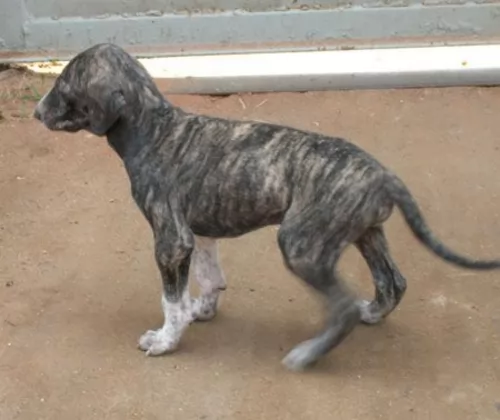 The Mudhol Hound is a good looking sight hound. Slender, sleek, muscular. They have narrow, long heads with a muzzle that tapers. They have long and powerful jaws with a large black nose. Their eyes are oval, large and brown with a look that pierces, and they have long, muscular, and clean shoulders. The legs are straight, long and strong with a broad, muscular, long back. Like most sight hounds when you seen them coming at you straight on, they have the appearance of being one dimensional.
The Mudhol Hound is a good looking sight hound. Slender, sleek, muscular. They have narrow, long heads with a muzzle that tapers. They have long and powerful jaws with a large black nose. Their eyes are oval, large and brown with a look that pierces, and they have long, muscular, and clean shoulders. The legs are straight, long and strong with a broad, muscular, long back. Like most sight hounds when you seen them coming at you straight on, they have the appearance of being one dimensional.
There are two types of coat and many acceptable colors. The coat can be silky on the tail, legs and ears or it can be completely smooth from head to toe. The coat can be grey, black, cream, red, fallow, and fawn. It can also be one of these colors and a small amount of shite blended it.
 The Cão de Gado Transmontano may look like a fairly formidable dog but they aren’t aggressive. They are full of courage and are above all, loving and loyal to their human family.
The Cão de Gado Transmontano may look like a fairly formidable dog but they aren’t aggressive. They are full of courage and are above all, loving and loyal to their human family.
When you choose to have one of these large dogs as your pet, it is important to make sure he knows that you’re the leader. With training and socialization this dog is a gentle giant who makes an exceptional family pet.
 The Cão de Gado Transmontano is a tough dog, used to spending long hours outside guarding sheep. These days however, he is also a companion dog and you’ll want to be aware of some common dog ailments that can strip him of his health and his joy of life.
The Cão de Gado Transmontano is a tough dog, used to spending long hours outside guarding sheep. These days however, he is also a companion dog and you’ll want to be aware of some common dog ailments that can strip him of his health and his joy of life.
Hip Dysplasia is a looseness with the hip joint, and while it can occur with all dogs, it is more common in large dogs. It’s a disease which can lead to arthritis, pain and also joint degeneration. It’s a disease which can be debilitating for the dog and you will need to get your dog to the vet.
This is a heart disease seen in large breed dogs and where the heart becomes weak and can’t properly pump blood throughout the body. Symptoms include coughing, weakness, difficulty with breathing as well as a fluid-distended abdomen.
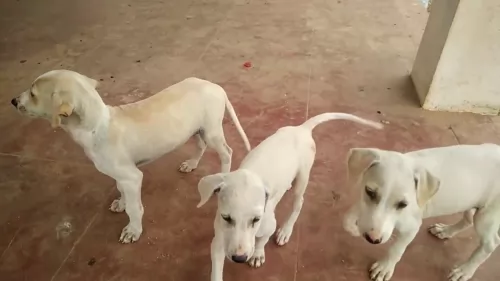 Like so many of the old breeds raised in a lot of isolation, the Mudhol is a very healthy breed. There are no genetic illnesses and they have a long line of dogs able to deal with the weather in India and avoid any sickness. However, they do have a few conditions they are prone to.
Like so many of the old breeds raised in a lot of isolation, the Mudhol is a very healthy breed. There are no genetic illnesses and they have a long line of dogs able to deal with the weather in India and avoid any sickness. However, they do have a few conditions they are prone to.
 Just because this is a large dog, doesn’t mean you need to over-feed him. He is muscular and athletic, and by watching his diet, he’ll continue to be strong, lean and healthy. You can feed him a top quality pet-food brand and include boiled chicken, rice and vegetables. Every now and then mix in some raw meat with his dog food to ensure that his skin remains free of rashes and itchiness. Fresh, cool water must be available to him day and night as he drinks abundantly.
Just because this is a large dog, doesn’t mean you need to over-feed him. He is muscular and athletic, and by watching his diet, he’ll continue to be strong, lean and healthy. You can feed him a top quality pet-food brand and include boiled chicken, rice and vegetables. Every now and then mix in some raw meat with his dog food to ensure that his skin remains free of rashes and itchiness. Fresh, cool water must be available to him day and night as he drinks abundantly.
Some dog breeds need to be trimmed or stripped to look good, and dog owners often invest in expensive equipment to groom their pets themselves, Fortunately the large Cão de Gado Transmontano is a low maintenance dog and all you’ll need to do is give him a good brush-down twice a week.
Check his eyes, ears, teeth and nails regularly. Remember that dental hygiene is imperative and special canine toothbrush and toothpaste is available to brush your dog’s teeth 2 or 3x a week to get rid of plaque and to prevent gum disease and tooth decay.
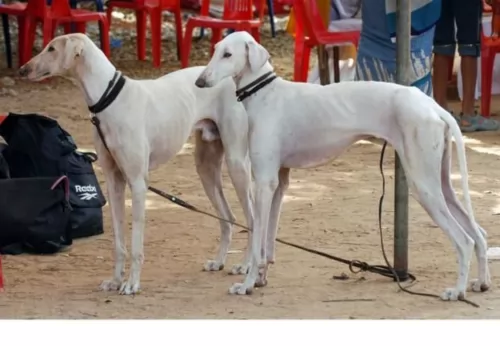 The Mudhol puppy needs a high quality dry food. They should eat three to four times a day in smaller portions. A total of 3 to 3.5 cups per day.
The Mudhol puppy needs a high quality dry food. They should eat three to four times a day in smaller portions. A total of 3 to 3.5 cups per day.
The adult Mudhol should eat about two and a half cups of high quality dry food twice a day. Do not overfeed the Mudhol and don’t let him run right after eating.
Outstanding speed and stamina
This is a high energy, active dog that needs a lot of space and exercise. She needs to be able to run freely as long as she wants at least a couple times a day. He has incredible endurance and a very high prey drive. They must be in a fenced area unless on a leash. They are great at lure coursing, fly ball and agility.